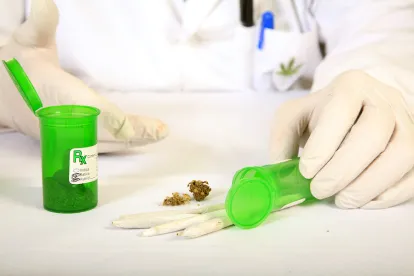In a case of first impression, the New Jersey Appellate Division held that it was appropriate for a workers’ compensation judge to order an employer to reimburse its employee for his medical marijuana expenses as part of his workers’ compensation case. Vincent Hager v. M&K Construction, Docket No. A-0102-18T3 (N.J. App. Div. January 13, 2020).
The employee, Vincent Hager, suffered an injury while working for M&K Construction in 2001, when a truck delivering concrete dumped the load onto him. Mr. Hager apparently suffered severe lower back pain that radiated through his legs, caused by herniated and annular discs in his spine, as well as nerve damage, causing chronic pain. The employee sought treatment, including spinal surgeries and opioid pain relief treatment, which were ultimately unsuccessful. M&K Construction and its insurer repeatedly denied workers’ compensation benefits.
As an alternative to opioid pain medication, Mr. Hager began treating with medical marijuana prescribed to him by an authorized physician. The use of medical marijuana provided pain relief to Mr. Hager, helped him sleep and curb his opioid pain medicine consumption. Mr. Hager paid approximately $616 per month out-of-pocket for his prescription, and his treating physician testified that he would need medical marijuana to manage his pain “for the rest of his life.” Other medical experts testified that Mr. Hager was partially disabled due to his workplace accident.
A workers’ compensation judge determined that Mr. Hager’s medical condition and consequences related to it were causally related to his accident at work; and that he exhibited permanent partial total disability of 65%, with 50% attributed to his orthopedic condition and 15% attributed to the effects of medical marijuana. The workers’ compensation judge ordered M&K Construction to reimburse petitioner for the costs of medical marijuana and any related expenses.
M&K Construction appealed, arguing that enforcement of the federal Controlled Substances Act (“CSA”)—which criminalizes the manufacture, possession, or distribution of marijuana and has no exception for medical marijuana—preempts the New Jersey Compassionate Use Medical Cannabis Act (“CUMMA”), because it is “impossible to comply with both statutes.” M&K Construction further argued that the CUMMA would require it to aid and abet the employee’s commission of a crime, that is, the possession of marijuana.
The New Jersey Appellate Division disagreed, determining that there was no conflict preemption between the CSA and the CUMMA, because “it is not physically impossible to comply with the CSA and the [CUMMA].” Rather, the Appellate Division found that “[u]nder the CSA, the possession, manufacture, and distribution of marijuana is a criminal and punishable offense. But an employer’s reimbursement of a registered [medical marijuana] patient’s use of medical marijuana does not require the employer to commit those offenses.” The Appellate Division also noted that the employer could not point to any evidence of federal prosecution of employers or insurance carriers for reimbursement of authorized medical marijuana treatment, and that a such speculative argument could not support a finding of conflict preemption. Moreover, the court noted that the federal government has not demonstrated any intention of enforcing the CSA in any state that has decriminalized marijuana.
The court similarly rejected M&K Construction’s argument that the CUMMA would require it to aid and abet the employee in the commission of a crime, reasoning that M&K Construction’s reimbursement of the employee’s medical marijuana costs will not satisfy the specific intent threshold needed for aiding and abetting liability. While the CUMMA expressly provides that a health insurer is not required to reimburse a person for the costs associated with medical marijuana, health insurance does not include workers’ compensation coverage.
The court further found that the employee’s use of medical marijuana was reasonable and necessary, because he suffered severe chronic pain and all other previous treatment modalities had failed to alleviate that pain. In addition, it allowed the employee to cease using opioids.
This case continues the trend of court rulings holding that marijuana’s status as an illegal drug under federal law is no obstacle to the enforcement of state medical marijuana laws. Employers should be aware of the legal issues that may arise when employees use medical marijuana in the jurisdictions in which they do business.




 />i
/>i

